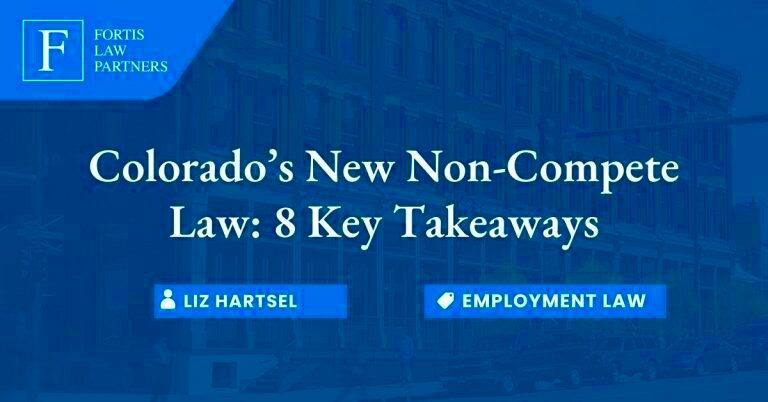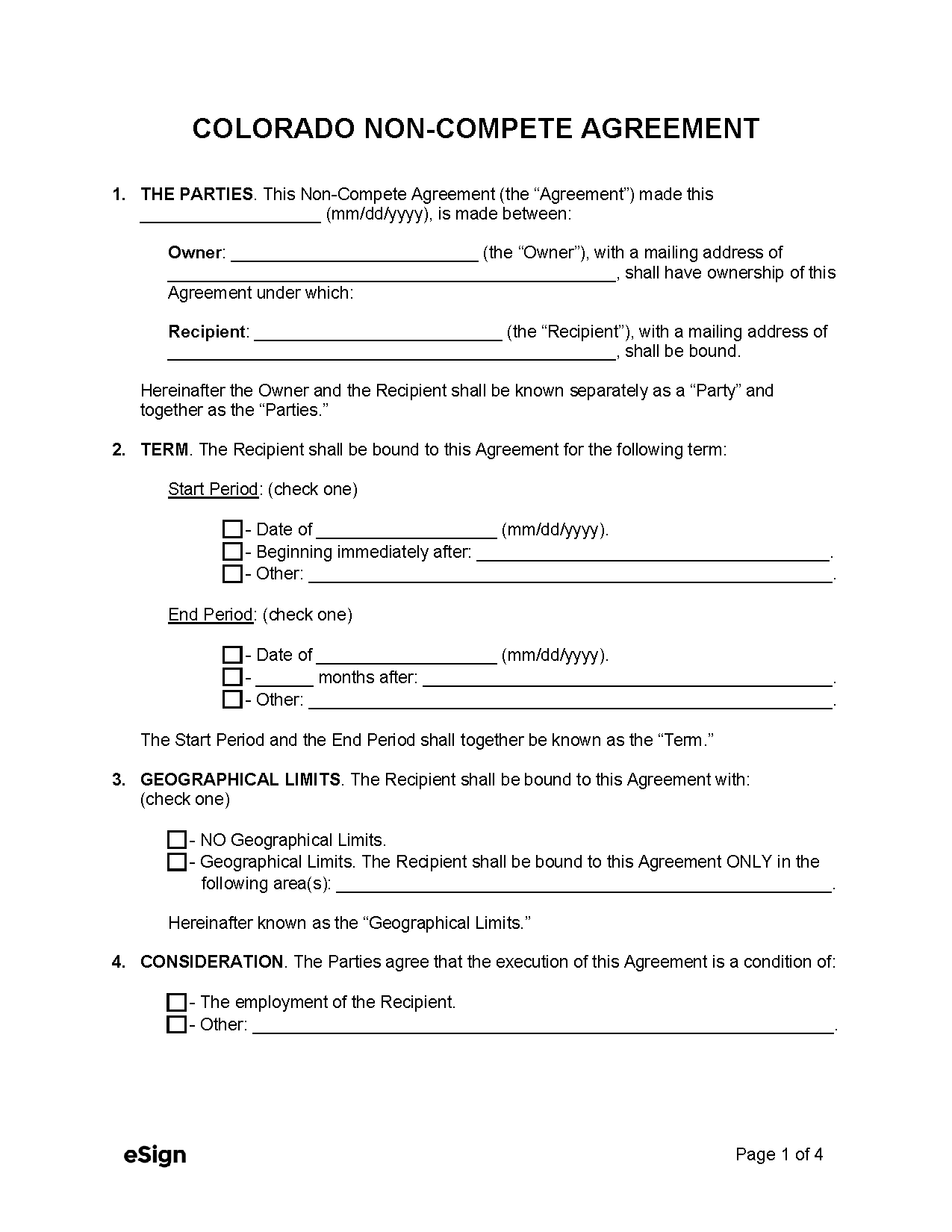Colorado Non-Compete Law 2024 Key Updates
Colorado’s non-compete law has undergone significant changes in recent years, impacting both employers and employees. Non-compete agreements are contracts that restrict an employee’s ability to work in similar roles after leaving a job. Understanding these laws is crucial for navigating employment relationships in Colorado.
Overview of Non-Compete Agreements

Non-compete agreements are designed to protect a company’s proprietary information and business interests. These contracts typically include several key elements:
- Duration: The length of time the employee is restricted from working in a similar field.
- Geographic Scope: The area where the restrictions apply, which can vary significantly.
- Nature of Activities: The specific activities that the employee is restricted from engaging in.
While these agreements can protect businesses, they can also limit employees’ career opportunities. Therefore, understanding the balance between protecting business interests and ensuring fair employment opportunities is essential.
Recent Changes in Colorado Non-Compete Law

In 2024, Colorado made notable updates to its non-compete laws, reflecting a growing recognition of employee rights. Here are some key changes:
- Prohibition of Non-Compete Agreements for Low-Wage Employees: Employers can no longer require non-compete agreements for employees earning less than $101,250 annually.
- Increased Transparency: Employers must provide clear information about the non-compete terms before employment begins.
- Limits on Duration: Non-compete agreements cannot exceed 12 months unless certain conditions are met.
- Protection for Independent Contractors: New rules have been established regarding the use of non-compete agreements for independent contractors.
These changes aim to enhance fairness in the workplace while still allowing employers to protect their legitimate business interests. It is essential for both employers and employees to stay informed about these updates to ensure compliance and protect their rights.
Key Updates for Employers
As an employer in Colorado, it’s crucial to stay on top of the latest non-compete law updates. The recent changes bring both opportunities and challenges. Here’s what you need to know:
- Review Non-Compete Agreements: Ensure all non-compete agreements comply with the new law. Agreements for low-wage employees should be eliminated or revised to avoid legal issues.
- Transparency is Key: You must provide clear information about the non-compete terms to employees before they start working. This includes outlining the duration, geographic scope, and activities restricted.
- Document Everything: Keep records of all communications regarding non-compete agreements. This can help clarify expectations and protect your business in case of disputes.
- Limit the Duration: Non-compete agreements can no longer exceed 12 months unless specific conditions are met. This change encourages fairness while still offering some protection for businesses.
By adapting to these updates, employers can foster a more positive work environment while safeguarding their interests. Always consider consulting with legal experts to ensure compliance and minimize risks.
Key Updates for Employees
For employees, the recent changes to Colorado’s non-compete law are significant and empowering. Here’s what you should know:
- No Non-Competes for Low-Wage Workers: If you earn less than $101,250 annually, your employer can’t enforce a non-compete agreement. This allows greater flexibility in seeking new job opportunities.
- Clear Understanding: Employers are required to explain the non-compete terms clearly before you accept a job. This ensures you fully understand what you’re signing and its implications for your career.
- Shortened Duration: The maximum duration for a non-compete agreement is now 12 months, which means you won’t be stuck in limbo for too long after leaving a job.
- Protection for Independent Contractors: If you’re working as an independent contractor, be aware that there are new rules regarding non-compete agreements that protect your rights.
These changes empower you to pursue new opportunities without being held back by restrictive contracts. Always read agreements carefully and seek legal advice if you have concerns.
Impact of Changes on Existing Agreements
The recent updates to Colorado’s non-compete law also affect existing agreements, and it’s vital for both employers and employees to understand these impacts. Here’s a breakdown:
- Review Existing Contracts: Employers should review their current non-compete agreements to determine if they comply with the new regulations. Those that don’t may need to be amended or terminated.
- Legal Challenges: Employees with existing agreements that are now deemed unenforceable can challenge these contracts. This opens doors for pursuing new employment without restrictions.
- Transition Period: Be aware that there may be a transition period where some older agreements might still hold, depending on when they were signed. It’s important to clarify this with legal counsel.
- Future Hiring Practices: As you prepare for future hiring, think about how these changes will affect your company’s recruitment and retention strategies. Offering clear terms can attract talent.
Overall, the impact of these changes encourages a more equitable work environment, balancing the needs of employers and employees. It’s an opportunity for both parties to engage in open discussions about expectations and rights.
Enforcement of Non-Compete Agreements
Enforcing non-compete agreements can be a tricky business, especially with the recent changes to Colorado’s laws. Understanding how these agreements are enforced is crucial for both employers and employees.
Here’s what you need to know:
- Legal Standards: Courts will now scrutinize non-compete agreements more closely to ensure they comply with state regulations. This includes checking the reasonableness of the duration, geographic scope, and specific activities restricted.
- Burden of Proof: The employer carries the burden of proving that the non-compete agreement is necessary to protect legitimate business interests, such as trade secrets or proprietary information.
- Potential Penalties: If a non-compete agreement is deemed unenforceable, the employer may face legal repercussions, including having to pay the employee’s legal fees or damages.
- Negotiation Options: Employees can negotiate terms before signing. If an agreement seems overly restrictive, discussing modifications upfront can prevent future issues.
Ultimately, understanding how enforcement works helps both parties navigate potential disputes more effectively. Employers should be prepared to justify their agreements, while employees should know their rights.
FAQ about Colorado Non-Compete Law
Here are some frequently asked questions about Colorado’s non-compete law to clarify any confusion:
- Can my employer enforce a non-compete agreement if I earn less than $101,250?
No, under the new law, employers cannot enforce non-compete agreements for employees earning below this threshold. - What happens if I break a non-compete agreement?
If you breach an enforceable non-compete agreement, your employer may take legal action against you. However, it depends on the agreement’s enforceability under the new law. - Are non-compete agreements for independent contractors allowed?
Yes, but there are new rules governing these agreements, which aim to protect the rights of independent contractors. - How can I challenge an existing non-compete agreement?
You can consult with a lawyer to evaluate the agreement’s enforceability based on the latest laws and consider your options for challenging it.
Being informed about these frequently asked questions can help both employees and employers navigate the complexities of non-compete agreements more confidently.
Conclusion on Key Updates
In conclusion, the updates to Colorado’s non-compete law bring significant changes that impact both employers and employees. These changes aim to strike a balance between protecting business interests and ensuring fair employment practices. Here’s a quick recap:
- No non-compete agreements for low-wage employees: This empowers lower earners to pursue new opportunities without restrictions.
- Greater transparency: Employers must clearly explain non-compete terms before hiring.
- Limited duration: Non-compete agreements cannot last more than 12 months unless specific conditions are met.
These updates provide a clearer framework for navigating non-compete agreements in Colorado. By understanding the implications, both employers and employees can engage in more productive discussions and make informed decisions. Staying aware of these changes will lead to better workplace relationships and a fairer job market.


